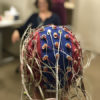Christopher Pelkey was shot and killed in a road range incident in 2021. On May 8, 2025, at the sentencing hearing for his killer, an AI video reconstruction of Pelkey delivered a victim impact statement. The trial judge reported being deeply moved by this performance and issued the maximum sentence for manslaughter.
As part of the ceremonies to mark Israel’s 77th year of independence on April 30, 2025, officials had planned to host a concert featuring four iconic Israeli singers. All four had died years earlier. The plan was to conjure them using AI-generated sound and video. The dead performers were supposed to sing alongside Yardena Arazi, a famous and still very much alive artist. In the end Arazi pulled out, citing the political atmosphere, and the event didn’t happen.
In April, the BBC created a deep-fake version of the famous mystery writer Agatha Christie to teach a “maestro course on writing.” Fake Agatha would instruct aspiring murder mystery authors and “inspire” their “writing journey.”
The use of artificial intelligence to “reanimate” the dead for a variety of purposes is quickly gaining traction. Over the past few years, we’ve been studying the moral implications of AI at the Center for Applied Ethics at the University of Massachusetts, Boston, and we find these AI reanimations to be morally problematic.
Before we address the moral challenges the technology raises, it’s important to distinguish AI reanimations, or deepfakes, from so-called griefbots. Griefbots are chatbots trained on large swaths of data the dead leave behind – social media posts, texts, emails, videos. These chatbots mimic how the departed used to communicate and are meant to make life easier for surviving relations. The deepfakes we are discussing here have other aims; they are meant to promote legal, political and educational causes.
Chris Pelkey was shot and killed in 2021. This AI ‘reanimation’ of him was presented in court as a victim impact statement.
Moral quandaries
The first moral quandary the technology raises has to do with consent: Would the deceased have agreed to do what their likeness is doing? Would the dead Israeli singers have wanted to sing at an Independence ceremony organized by the nation’s current government? Would Pelkey, the road-rage victim, be comfortable with the script his family wrote for his avatar to recite? What would Christie think about her AI double teaching that class?
The answers to these questions can only be deduced circumstantially – from examining the kinds of things the dead did and the views they expressed when alive. And one could ask if the answers even matter. If those in charge of the estates agree to the reanimations, isn’t the question settled? After all, such trustees are the legal representatives of the departed.
But putting aside the question of consent, a more fundamental question…



